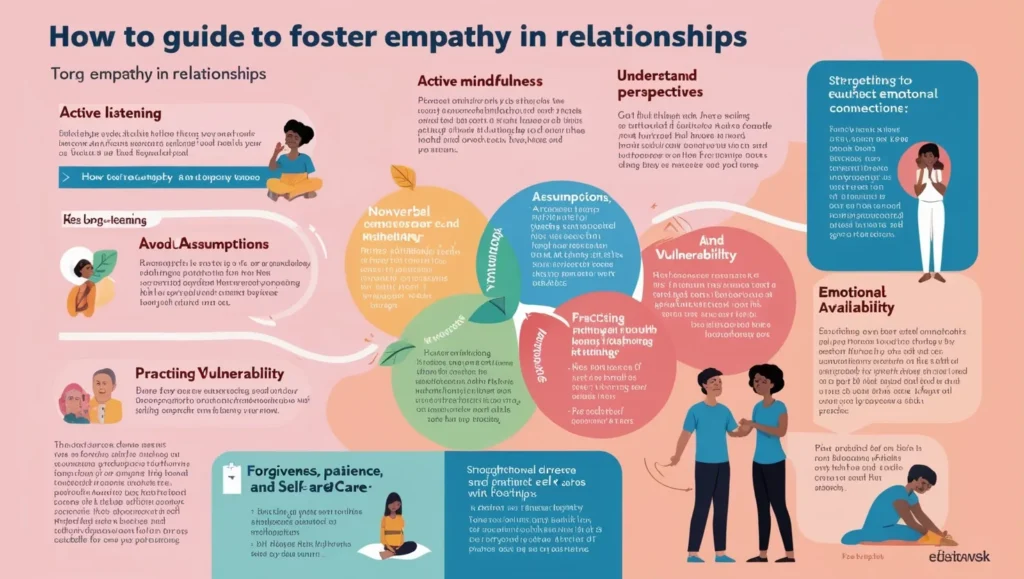How to Foster Empathy in Your Relationships
Empathy—the ability to understand and share the feelings of another—is the cornerstone of healthy relationships. It bridges gaps, resolves conflicts, and nurtures deep connections. In a world that often feels fast-paced and disconnected, fostering empathy is not just essential for personal relationships but also for fostering a sense of community and belonging. Here’s a comprehensive guide to fostering empathy in your relationships.
1. Understand What Empathy Is
Before you can foster empathy, it’s essential to understand what it truly means. Empathy involves:
- Cognitive empathy: Understanding someone’s perspective.
- Emotional empathy: Feeling what someone else feels.
- Compassionate empathy: Taking action to help when needed
True empathy goes beyond mere sympathy; it requires actively stepping into someone else’s shoes and experiencing their reality.
2. Cultivate Active Listening
Active listening is one of the most effective ways to show empathy. Here’s how to practice it:
- Be present: Focus on the person speaking without distractions. Put away your phone or turn off the TV.
- Validate their feelings: Acknowledge their emotions without judgment. Phrases like “I understand why you feel that way” can go a long way.
- Ask open-ended questions: This encourages the other person to share more deeply.
Active listening builds trust and shows the other person that their thoughts and emotions are valued.
3. Practice Nonverbal Communication
Nonverbal cues are powerful indicators of empathy. Make sure your body language aligns with your intent to connect:
- Maintain eye contact: This shows attentiveness and sincerity.
- Use appropriate touch: A hug or a comforting pat on the back can convey empathy better than words.
- Mirror emotions: Reflect their emotions subtly to demonstrate that you understand how they feel.
4. Avoid Assumptions
Jumping to conclusions can hinder empathy. Instead of assuming you know what someone else is going through, take the time to:
- Ask for clarification: If you’re unsure about their feelings or experiences, ask questions.
- Avoid projecting: Refrain from inserting your experiences into their situation unless they ask.
By avoiding assumptions, you allow space for genuine understanding to flourish.
5. Share Your Vulnerabilities
Empathy is a two-way street. Sharing your emotions and experiences can encourage others to do the same. Vulnerability fosters deeper connections and helps people feel safe sharing their struggles.
6. Educate Yourself on Diverse Perspectives
Expand your understanding of different cultures, beliefs, and experiences. Empathy grows when we challenge our own biases and step outside our comfort zones:
- Read books, watch documentaries, or listen to podcasts that explore different perspectives.
- Engage with people from diverse backgrounds.
- Approach conversations with curiosity rather than judgment.
The more you understand others’ experiences, the easier it becomes to empathize.
7. Be Patient and Practice Mindfulness
Empathy takes time and effort. Practicing mindfulness can help you become more attuned to the present moment and the emotions of others. Techniques include:
- Deep breathing to stay calm during difficult conversations.
- Meditation to enhance self-awareness and reduce emotional reactivity.
Being patient with both yourself and others allows empathy to grow organically.
8. Apologize and Forgive
When conflicts arise, empathy plays a crucial role in resolving them. A sincere apology shows that you understand the impact of your actions. Similarly, forgiving others demonstrates compassion and a willingness to move forward.
9. Prioritize Emotional Availability
Empathy requires emotional bandwidth. Take care of your mental and emotional health so that you can be fully present in your relationships. Self-care—such as journaling, therapy, or engaging in hobbies—helps you maintain this balance.
10. Celebrate Progress and Connection
Building empathy is a journey, not a destination. Celebrate the moments when you connect deeply with others. Recognize the progress you’ve made in understanding and supporting those around you.
Final Thoughts
Fostering empathy in your relationships is not only about understanding others but also about strengthening the bond between you and the people who matter most. By listening actively, being vulnerable, and embracing diverse perspectives, you can create a nurturing space for emotional growth and connection.
In a world that can feel divided, empathy is the bridge that unites us. Start building that bridge today—one conversation, one connection, and one act of kindness at a time.

